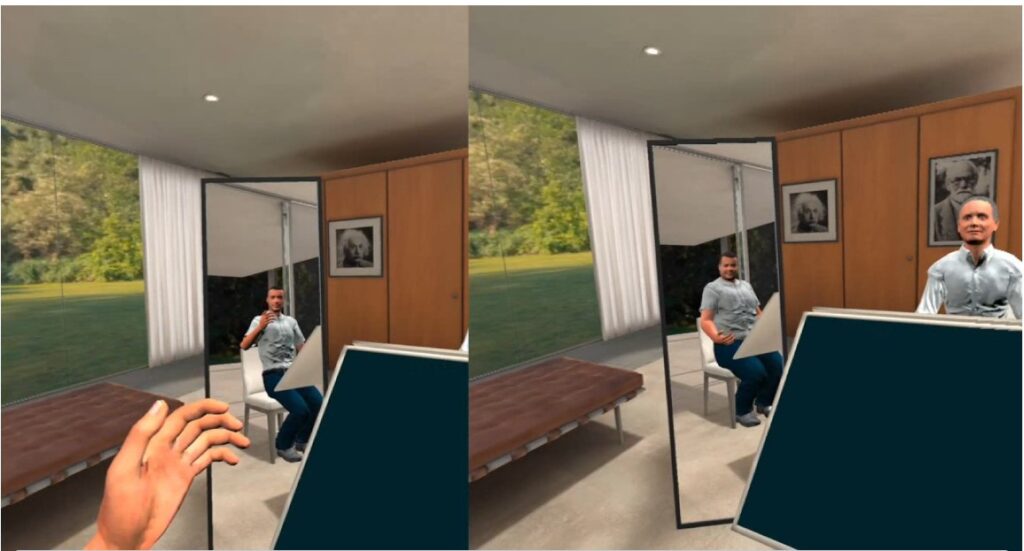The diverse team of experts that make up the Socrates project are aware that obesity is a complex health issue with both physical and psychological components. On the path to health and welfare, self-stigmatization, or the phenomenon wherein obese people attach unfavourable preconceptions to themselves, can be a significant roadblock. Fortunately, we are altering the story through immersive virtual reality (IVR). The IVR allows us to create personalised avatars, which are detailed digital representations of patients. By interacting with their avatar in a safe and controlled environment, patients can begin to change their relationship with their body and improve their self-esteem.
The “body ownership illusion”[1] method, which the IVR uses to give patients the impression that the avatar is an extension of themselves, facilitates this process. Patients can visualize and experience their bodies more objectively through this immersion, which lowers self-shame and promotes healthier, longer-lasting behavioural adjustments.
Personalized avatars can also be used to track a patient’s development and show them how they will appear and feel after implementing a healthier lifestyle [2]. This method empowers patients and gives them a real objective to strive for (Figure 1).

Avatars that are customized go beyond just digital representations. They are constructed using a combination of our patients’ current data and health objectives, and they are representations of their aspirations. These avatars offer a physical and emotional experience in addition to being a visual tool. Patients can ‘experience’ the potential advantages of lifestyle modifications by interacting with their avatar, which can be a strong incentive. When patients have a digital “self” to identify with and take care of, their motivation and engagement really significantly increase, according to our study [3]. This emphasizes the importance of using cutting-edge technologies like IVR into programs to treat obesity.
In conclusion, Socrates project is utilizing virtual reality to combat self-stigmatization in the treatment of obesity. We think that IVR has a significant potential to raise people’s self-esteem and encourage long-lasting behavioural improvements.
Bibliography:
- Slater, M., Perez-Marcos, D., Ehrsson, H. H., & Sanchez-Vives, M. V. (2008). Towards a digital body: the virtual arm illusion. Frontiers in Human Neuroscience, 2, 6.
- Slater, M., & Sanchez-Vives, M. V. (2016). Enhancing our lives with immersive virtual reality. Frontiers in Robotics and AI, 3, 74.
- Slater, M., Rovira, A., Southern, R., Swapp, D., Zhang, J. J., Campbell, C., & Levine, M. (2013). Bystander responses to a violent incident in an immersive virtual environment. PloS one, 8(1), e52766.
- Anastasiadou D, Slater M, Spanlang B, et al. Clinical efficacy of a virtual reality tool for the treatment of obesity: study protocol of a randomised controlled trial. BMJ Open. 2022;12(6):e060822. Published 2022 Jun 22. doi:10.1136/bmjopen-2022-060822
About the author
Elena Álvarez de la Campa Crespo has a PhD in Computational Biology at the Universitat de Barcelona (2019). She is graduated in Biotechnology (2013) and with a Master in Genetics and Genomics (2014). Her doctoral research in the field of computational biomedicine, carried out at Vall d’Hebrón Research Institute (VHIR) and at Centro de Investigaciones Científicas (CSIC), has revolved around understanding the molecular bases of specific systems and characterizing the impact of genomic sequence variants, with a strong focus on knowledge, determination and computational prediction of protein structures and their molecular modelling. A central axis of her research has been the creation of machine learning models to improve the annotation of genomic sequence variants in sequencing projects, increasing the scope of in silico tools in the clinical environment. All the knowledge gained during her research, a rigorous scientific approach and her first-level analytical and problem-solving skills, have contributed to become part of Virtual Bodyworks. Her role in the company is to be an analyst and data scientist, specialist in Artificial Intelligence, and to manage leading projects in the field, adapted to the creation of Immersive Virtual Reality (IVR) applications for medical and social rehabilitation purposes. Both professional careers have endowed her with a great capacity for working on collaborative projects with higher research institutions and also with a considerable experience in grant management, especially European Grants (Horizon 2020, EIT, Interreg-POCTEFA).
